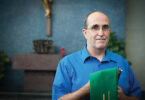
by Leon Suprenant
In my work with our deacon community, I probably think more about who preaches the homily and how to preach a homily more than most people.
The General Instruction of the Roman Missal (GIRM) says that the “homily should ordinarily be given by the priest celebrant himself or be entrusted by him to a concelebrating priest, or from time to time and, if appropriate, to the deacon, but never to a layperson” (66).
Of course, there are differences of opinion when it comes to interpreting “from time to time” and “if appropriate,” and every pastoral situation is different. So, it’s impossible to say with precision how often a deacon should preach the homily at Mass.
Yet, we can all readily affirm that a deacon is the only person who may preach the homily at Mass other than a bishop or priest, so part of the training that our deacon candidates receive is in the area of homiletics, or the art of preaching. This training is something we take very seriously.
All of us have a duty to preach the Gospel in our lives. In a particular way, I think of all Christian parents, who are the “first heralds” of the Gospel for their children (Catechism of the Catholic Church, 2225).
Yet, the homily, especially the Sunday homily, is of unique importance. Pope Emeritus Benedict XVI stressed that the homily is a means of bringing the Gospel to life in a way that helps us realize that God’s word is present and at work in our daily lives.
Further, recent popes have stressed that preaching at Mass should set our hearts on fire and lead to a life-changing communion with Christ in the Eucharist (cf. Lk 24:29-35).
Yet it occurs to me that while relatively few people are called to give homilies, all of us are called to receive homilies. We are never so advanced in our journey of faith that we don’t need the word of God opened for us by our priests and deacons.
Perhaps one of our Lenten resolutions this year may be — in whatever way works for us — to enter more fully into God’s word, which is living and active in our midst (cf. Heb 4:12).
As we are reminded during Lent, we do not live on bread alone, but on every word that comes from the mouth of God (Mt 4:4). But sometimes we need assistance.
In the Bible, an Ethiopian official once complained that he could not understand what he was reading without someone to instruct him. At that point, the deacon Philip opened the Scriptures and proclaimed Jesus to him (cf. Acts 8:26-40).
This Lenten season, may we be consciously open to God’s word coming alive to us, drawing us into deeper communion with Christ.

